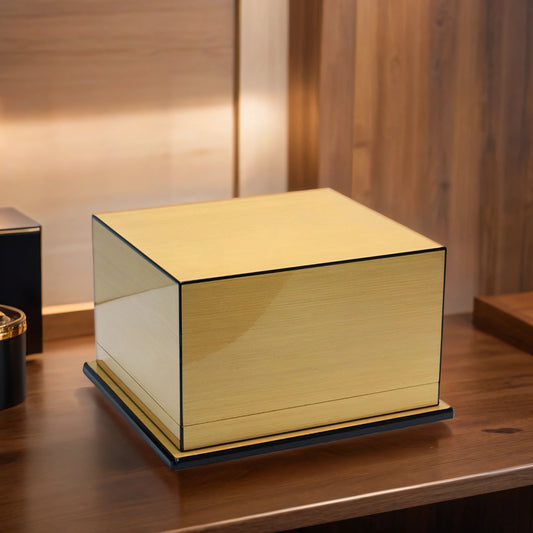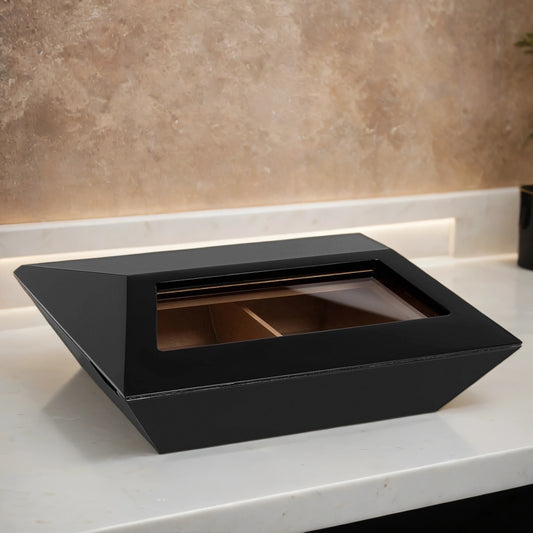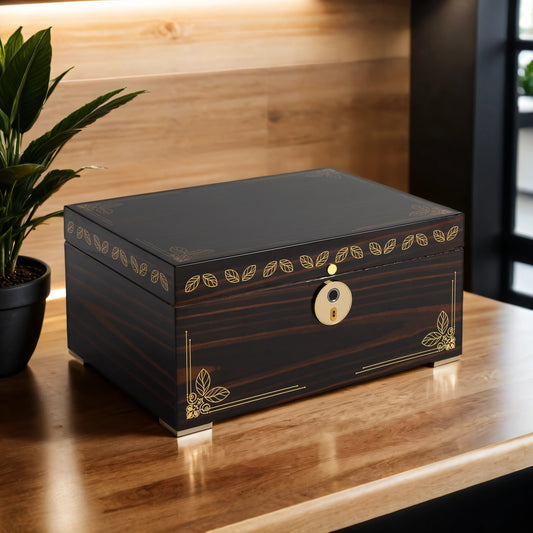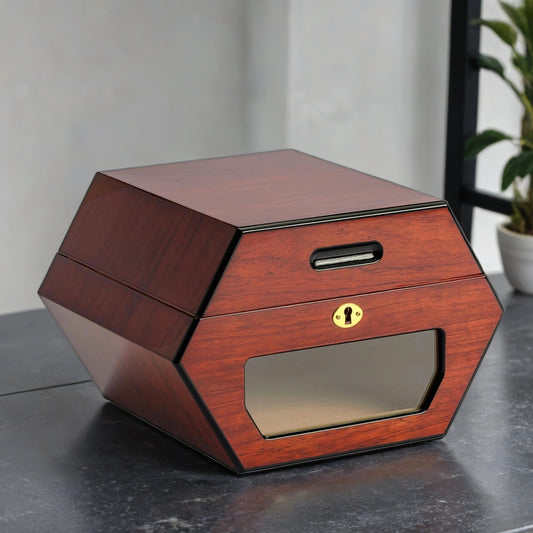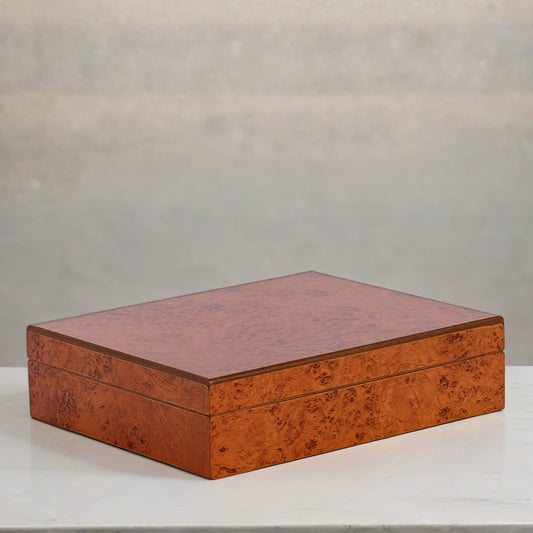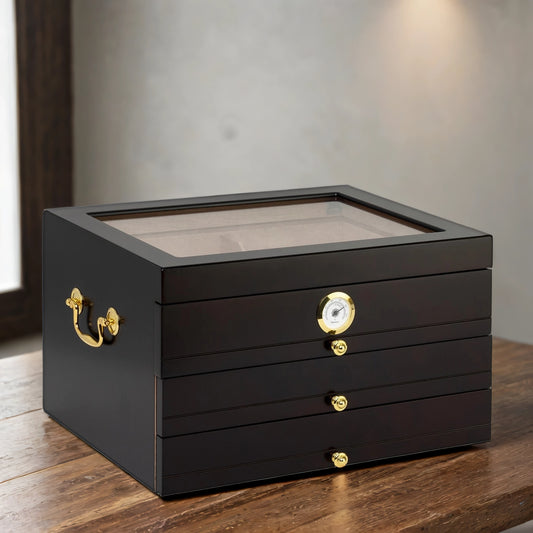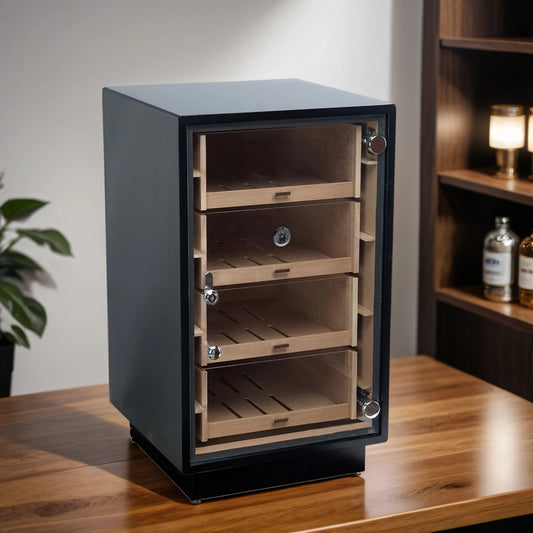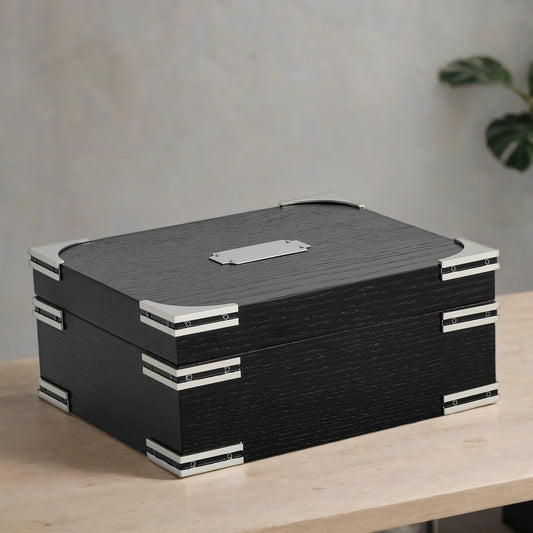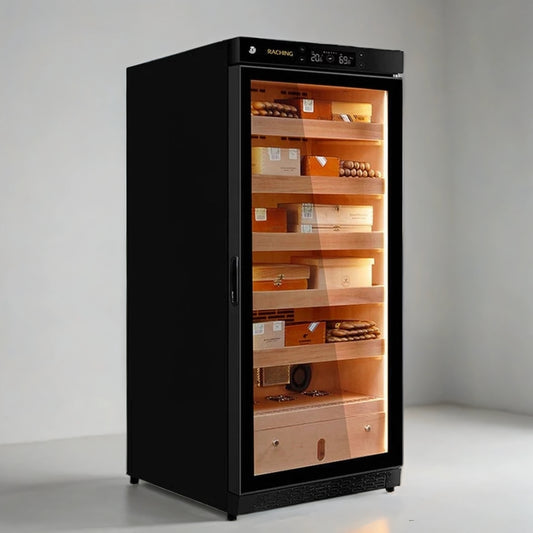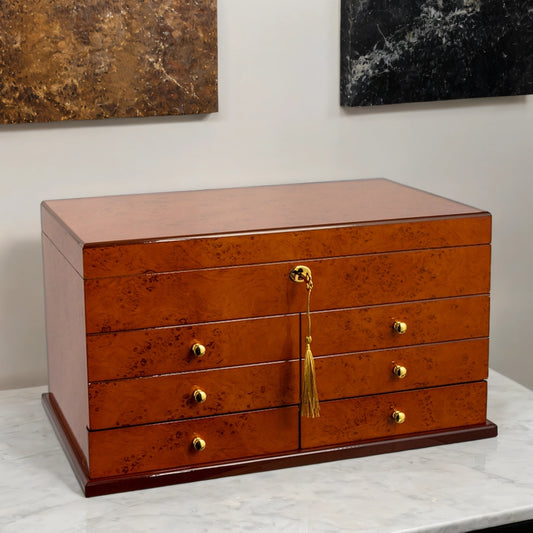
What Is A Humidor? All You Need To Know.
Storing cigars isn’t as simple as tossing them in a drawer and hoping for the best. Premium cigars are handcrafted, humidity-sensitive works of art, and they require proper care to maintain their flavor and structure. That’s where the cigar humidor comes in. If you’ve ever wondered why your cigars crack, unravel, or taste like cardboard after a few weeks, chances are you’re missing this essential piece of the puzzle.
What Is a Humidor?
A humidor is a storage container designed to maintain a stable level of humidity, usually between 65 and 72 percent. It keeps cigars fresh by preserving the delicate oils and flavors in the tobacco leaves. Without a humidor, cigars dry out, lose their flavor, or worse, become brittle and unsmokeable. Think of it as life support for your cigar collection.

What Does a Humidor Do?
A humidor regulates both humidity and temperature to mimic the natural environment where cigars are aged. This prevents the tobacco from drying out or absorbing too much moisture. If cigars get too damp, they may mold or burn unevenly. Too dry, and they burn hot and harsh. The humidor makes sure your stogies are always in their prime smoking condition.
What Is a Humidor Used For?
A humidor is used primarily to store and age cigars, but some people also use them for pipe tobacco or specialty cigarettes. By keeping a consistent climate, a humidor helps develop richer, smoother flavors in cigars over time. It is the difference between an okay smoke and a remarkable one.
Parts of a Humidor
Most humidors contain a few essential components:
- Humidifier: Adds moisture to the air using a sponge, gel, or Boveda pack
- Hygrometer: Measures humidity levels. Digital ones are more accurate
- Spanish Cedar Lining: Absorbs and releases moisture, resists mold, and enhances cigar flavor
- Seal: A good seal ensures minimal air exchange and stable conditions
Each part plays a role in creating a controlled environment. Without one, your cigars could be toast or worse, beetle bait.

How a Humidor Works
A humidor works by maintaining a controlled humidity level using a humidifying device and sealed environment. The interior Spanish cedar absorbs excess moisture and releases it slowly to prevent swings. A hygrometer lets you monitor the levels. Seasoning your humidor before use helps the wood reach a balanced humidity, making it more effective from day one.
Types of Humidors
- Desktop Humidor: Holds 20 to 150 cigars. Great for casual collectors
- Travel Humidor: Compact and durable, meant to protect cigars on the go
- Cabinet Humidor: Furniture-sized and built to hold hundreds to thousands of cigars
- Walk-In Humidor: Found in cigar shops or serious collectors’ homes. Basically a cigar vault
- Electric Humidor: Uses electronic humidity and temperature control for precision storage
Pick one that suits your lifestyle. No shame in starting small and upgrading as your cigar obsession grows.
How Much Are Humidors?
Humidor prices vary wildly. A basic travel humidor might cost 40 to 80 dollars. A quality desktop humidor typically ranges from 100 to 400 dollars. Cabinet and electric humidors, like a Raching humidor, can range from two to five thousand, depending on materials and capacity. You're not just buying a box. You're investing in the flavor and life of your cigars.

How to Maintain a Humidor
- Season it first: Wipe down the interior with distilled water or use a Boveda seasoning pack
- Monitor humidity: Keep it between 65 and 72 percent. Avoid large swings
- Refill your humidifier regularly
- Calibrate the hygrometer monthly
- Rotate your cigars so they age evenly
If your cigars start cracking or feel like wet sponges, your humidor maintenance might need a tune-up. It's always best to focus on prevention, but if you do need to revive your cigars, please see our guide on how to rehydrate a cigar.
Common Mistakes to Avoid
- Storing cigars without seasoning the humidor
- Overfilling it with too many cigars
- Using tap water in humidifiers
- Not checking humidity regularly
These small missteps can ruin good cigars. It is like storing wine on top of your fridge. Technically possible, but a terrible idea.

Final Thoughts
A humidor is one of the most important tools in a cigar smoker’s arsenal. It protects your cigars from humidity swings, aging them gracefully while preserving their flavors. Whether you’re just getting into cigars or already have a growing collection, having a well-maintained humidor is a sign you take your hobby seriously. If you smoke them, you better store them right.
Frequently Asked Questions
Do I really need a humidor to store cigars?
Yes, unless you plan on smoking your cigars within a day or two of buying them. Cigars need stable humidity to stay fresh, flavorful, and smokable. Without a humidor, they’ll dry out or get too moist, both of which ruin the experience. Even a small travel humidor or tupperdor setup is better than nothing.
Can I store cigars in the fridge?
No. Refrigerators are too dry and can cause the wrapper to crack. Worse, they fluctuate in temperature and are full of food smells that cigars soak up like sponges. The result? A cigar that tastes like a ham sandwich. Always store cigars in a humidor or a controlled environment designed for tobacco.
How long can cigars last in a humidor?
Properly stored cigars can last for years, even decades. In a humidor kept around 65 to 70 percent humidity and 65 to 70 degrees Fahrenheit, cigars not only stay fresh but can also improve with age, similar to wine. Just make sure to maintain consistent conditions and check your hygrometer occasionally.
What humidity level is best for cigars?
The sweet spot is 65 to 70 percent relative humidity. Some cigar smokers prefer slightly lower or higher, depending on their location and taste. Too much humidity and your cigars can get moldy or burn unevenly. Too little and they’ll dry out and burn too fast.
What’s the difference between a cheap humidor and a premium one?
Cheap humidors might look nice on the outside but often lack quality Spanish cedar lining or a proper seal. That means they struggle to hold consistent humidity. Premium humidors, on the other hand, regulate humidity better, last longer, and protect your collection more reliably. Think of it like wine storage: you can store bottles in a closet, but a proper wine fridge gets the job done right.

